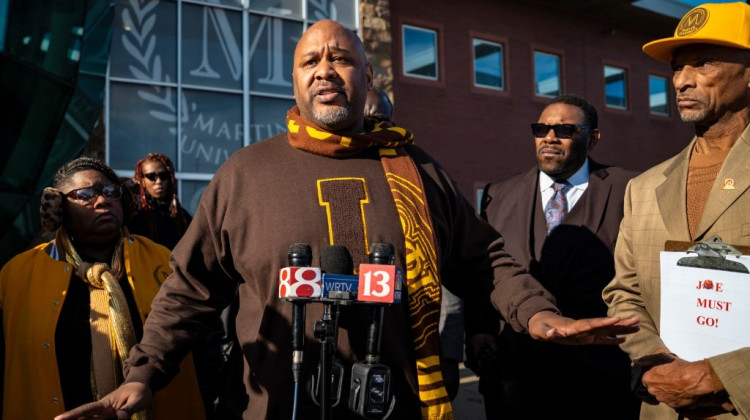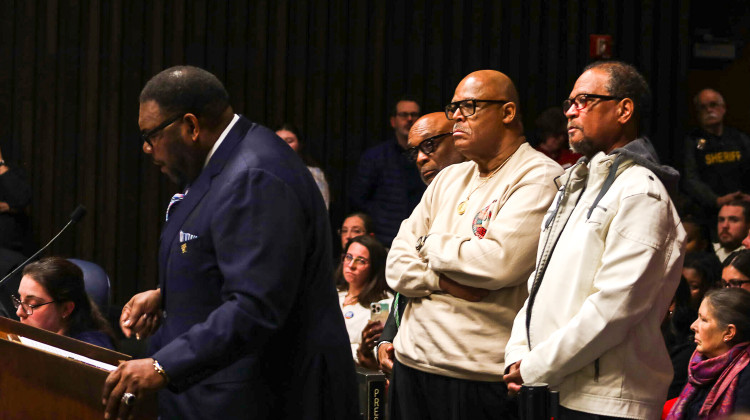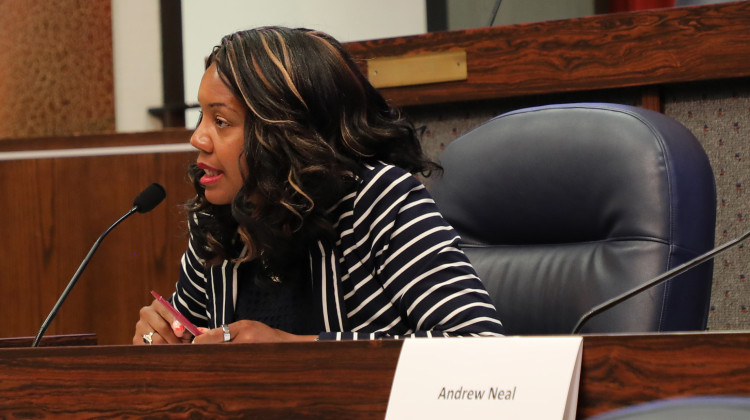
Purdue President Mitch Daniels will step down from his role at the end of December (WBAA News/Ben Thorp)
WBAA News/Ben ThorpAfter a decade at the helm of Purdue University, Mitch Daniels is set to step down as president at the end of this year.
Daniels spoke with WBAA’s Ben Thorp about his time at the school – and what comes next. Questions and answers have been edited for clarity.
Thorp: You have just two months left here at Purdue University after serving as president for a decade. We spoke at the announcement of Mung Chiang as your successor, and I asked you if you'd begun to reflect on your time here. You said it was too soon. I'm wondering if that process has started yet? Or are we still kind of waiting to get to the finish line?
Daniels: You can't help reflecting, so of course I do. But what I don't do is try to pronounce judgment on, as people say, the legacy and so forth. I leave the scorekeeping and the grading of the course to people like you.
Thorp: I'm wondering, as you look back, are there things that you identify and you say: this is the thing that I am kind of particularly proud of with my time here?
Daniels: It's a natural question – I haven't found a single answer to it. I can wrap multiple things I feel good about under the general heading of growth. In other words, clearly, we've grown numerically in terms of the number of students we're turning out. And that's the basic assignment of this place. We've grown, I think, in reputation – I think that's provable. We've grown in economic impact, whether it's startup companies, or companies we've attracted from elsewhere to this, to the environment around our campus. So I do feel it's been a time of growth and improvement at Purdue. That's what you hope to see at the end of any assignment.
Thorp: So on the topic of growth, we are seeing enrollment declining nationally, especially here in Indiana, with the obvious exception of Purdue. What kinds of changes does higher ed need to attract students? And how much of Purdue's success do you attribute to your over a decade's worth of the tuition freeze that we hear so much about?
Daniels: In an interview – and it might have been WBAA – at the front end of this experience, somebody asked me a question about the challenges to higher ed, which were evident, I thought, then let alone now. And off the cuff, I said, we're out to deliver higher education at the highest proven value. And I've not found a more concise way, or I think, a more accurate way to describe what we're trying to do, or what I think higher ed, as a sector, ought to emphasize highest proven value.
And value is the keyword. It picks up, of course, cost, which people have noticed that we are unusual in that respect. But I never let anybody talk about that in isolation. It's the denominator of the key equation. That is to say, quality over price. And we would never sacrifice quality in order simply to hold down the price. So, I think there's compared to 10 years ago – and I don't know why it took so long, because sticker prices and tuition prices and fees were out of control even then – but there, finally, is appropriate scrutiny of value in higher education. Those that provide it, I think, will continue to be invaluable to society and to their students and graduates. Those that don't will struggle, and they deserve to.
Thorp: In some respects, you're saying this is warranted? I hear out in the community – often people are saying, 'What am I getting for this degree?' And you're saying that that is a worthwhile question to be asking.
Daniels: Entirely appropriate question. I haven't looked at it in a long time. But I've made it a practice to write an annual letter at New Year’s, as opposed to subject anybody to a speech, which some, you know, they do at some places. And the one that I published upon arrival, I said a lot of these things – I'm sure if I'd look at it now, I'd smile at some of the things that were off the mark. But it was pretty clear. Even then, the day had to come when people would challenge the idea that every college, or a four-year residential college, was the right answer for everybody or that it was the right answer, given the price tag that was being charged. And now that that awareness – that scrutiny, as I said, is everywhere. And that is entirely appropriate.
What I think we all can agree on is that ideally, every American would continue learning and growing after high school and in fact, on an ongoing basis. But that doesn't mean that that four-year college, which was sort of being held up 10 years ago, as the target for everybody was the right one.
Thorp: I think it is fair to say that some people might choose Purdue because of Mitch Daniels being at the helm. Are there any concerns or any conversations that you're having about - as you're stepping away - might that have an impact on it?
Daniels: I don't think so. On the day we're recording this, we've just come to the end of the early decision application period – here comes another record. And I will say yes, I run into students, I get nice letters from people who personalize it a little bit. But I hope that what they will see is that whatever changes we made, it's not about me, it's the culture of this place. And the quality of this place as it has, I believe, evolved and grown over the last 10 years. So now, I'm not worried about that.
What I'm worried about, yet again, is the fact that we will probably have to say no to some outstanding students, just because we can't get really much bigger here. At least under present circumstances, but as your question suggests, that's not the worry that they're having on too many campuses this morning.
Thorp: So you mentioned early decision time and record enrollment. There were some questions as Indiana was passing its near-total abortion ban about ‘will this impact out-of-state students making a decision, whether or not to come here?’ Is that something that you're seeing or concerned about?
Daniels: I didn't think it would have an effect, and we're clearly not seeing it. We're gonna again, we're gonna break – I think – last year's record by another several thousand applications. So not saying that there isn't somebody somewhere who might decide on that basis, but I think that was overblown at the time and seems pretty remote now.
Thorp: So earlier this morning, I saw that Nebraska Senator Ben Sasse has been named as the incoming president of the University of Florida. I'm wondering – what were your hurdles in moving from politics into university government? What are some things you might say to Senator Sasse, as he kind of takes over?
Daniels: Well, I had more handicaps than he does, because he's actually been in higher ed before. He was actually the president of a small school for a short time. And, you know, went through the entire doctorate process. So he'll do great. I mean, the obstacles, perfectly legitimate questions: 'What does this guy know? Or is this some sort of temporary holding pattern part of a plan to return to politics?’ I mean, there have been a couple of people do that before. These were all very legitimate questions and I just tried to go to work to dispel those very natural concerns. I think he'll have fewer of them. Again, he brings some credentials, I didn't. He's a terrific talent. And they're going to be very lucky to have him.
[The] University of Florida is starting to show up on a couple of lists that we watch because we're high up in patent startup companies in certain rankings, for instance. And of course, that's a state on the rise. So its state university is almost certain to become more and more prominent and with Ben, and I do know him, leading it I think you can expect them to be a nationally recognized school in a bigger way than ever over the next several years,
Thorp: Do you think we'll see more of these kinds of politicians moving into university spaces?
Daniels: I don't see any particular trend. It's not brand new. You know, when I got this job I had six months between saying yes and starting. I had this other job to finish, and I tried to use every spare moment. I read every book, made a lot of field trips, here and elsewhere. And I talked to everybody I could find – two of the people that I talked to fairly early on were David Boren, former governor and senator of Oklahoma, who spent a long time as president there. And Hank Brown, a former senator from Colorado, who had a very successful leadership at that university, their state university.
So it's not new. It's just episodic, it happens here and there. And I don't expect it to become suddenly very prevalent. I'd like to think those people I just mentioned are illustrations that it can work, that somebody with a strong appreciation for the importance of higher ed and the value of higher ed can be an effective spokesperson. And here and there an author of some changes, to move it in the direction that will preserve it and promote its interest.
Thorp: So I have been here about two years, and have already in that time seen a number of massive announcements and partnerships, from Saab to Rolls Royce to Skywater. Those business partnerships with the university feel like an important part of what your leadership has brought to Purdue. Can you talk about why?
Daniels: Two whys. And you're absolutely right, that we've made a big emphasis of this from the beginning. Now, remember, I'd spent the previous 10 years with one central mission: to make Indiana, if we could, a place of greater promise and prosperity and upward mobility, and so forth. And so there was nothing we worked on harder. Everything, in a way, pointed toward that – how do we make this the best climate for investment and business and new jobs and so forth. Well, one reason – and maybe the biggest single reason – I finally said yes to this job was that I can see Purdue playing a great role in that. There's no better economic magnet or asset that a state can hope for in this world of today than a STEM-oriented, top-flight research university. And so, from the day I got here, I thought this is a) part of our public responsibility: you know, taxpayers send us a quarter of a billion dollars a year. Since we're in a position to help try to create new opportunities for people, we absolutely should do it.
The second reason is in Purdue's self-interest. I hope it'll attract more people like you – you came here a couple of years ago – we got a lot of people coming here either individually, or as corporate entities. This is one of the fastest growing economies in the country, measured in per capita income; it was just, again, in the top 10 real estate markets in the whole country. It's because of us, first and foremost. And so if we can keep that momentum going, I believe the environment here around our campus will become more and more vibrant. And attract – I keep saying that's how we're going to attract the next Nobel Prize winners. and more and more great students. So those are the two reasons. Part of it is public duty. Part of it is because it is in Purdue’s long-term interest.
Thorp: You have mentioned at several of the press conferences that I've been to this idea of West Lafayette as a potential boomtown. Are there more projects on the horizon here?
Daniels: Yes. There are. I mean, never any guarantees. An economic slowdown could put a crimp in some of that, but we have active conversations right now with other companies, and plus you get a little momentum when Skywater comes. There's a very good chance that customers or suppliers to them might want to make some investments here too. So you know, I think you've already heard the first couple of booms.
Thorp: Because I attend the West Lafayette City Council [meetings], and I'm sure you've heard: there are often people sitting on the council, or members of the community who will say – what is our community becoming? Do we want it to go in this direction? Particularly, I think, the size of the growth. And sometimes concerns about what are these industries that are moving here. Do we feel comfortable with them? Anything that you would say to that?
Daniels: I think they appreciate the tax dollars. I don't think they want to turn those down. I think that would be a very reactionary, and short-sighted, ill-advised posture for them to take. And I'd be very surprised if it... it would be so counter to the interest of their constituents. It's one thing to express a little concern, but if that became an active policy there, I think somebody would stand up and say, in whose interests are you acting?
Thorp: The Supreme Court is currently considering a case that may overturn affirmative action. Do you have any perspective on that?
Daniels: I don't want to make a comment on an active case like that. You know, I'll just say that we're working very hard. We have all sorts of extraordinary activities here. That, by the way, are showing some very good effects and results to increase the recruitment and the success of students that have been underrepresented here. We're not doing it by discriminating on the basis of race. And I'd like to think that, you know, we can continue to bring variety to this campus without discriminating against anybody.
Thorp: Lastly, we're at the point in your tenure where every speech of yours is now getting picked over for what it might tell us about your future plans. In your recent conversation with Brian Lamb, a lot was made over your use of the phrase 'the last political debate of the last campaign I'll be in', with people wondering whether this was a signal that you would not be returning to politics. Anything more to add on what might come next for you?
Daniels: No. Fair question. I've not been inclined, and I'm not saying I wouldn't listen to that or other suggestions about the things I do. I have not been any good in the past at anticipating what might be next. I didn't anticipate this job, I didn't anticipate running for office the one time I did, I didn't anticipate going back to the federal government, I didn't anticipate going into the pharmaceutical business all those years ago, and so forth. And so, I've learned not to say never, but it's certainly no plan that I've had.
Thorp: Is there anything I haven't asked you that you want to touch on?
Daniels: Yeah, a little bit. Oh, that I want to touch on? Well, yeah, you haven't asked me what bowl game we're going to be in.
Thorp: You're right. You hope it's a big one?
Daniels: I'll know a little more after Saturday.
Thorp: President, thank you so much for taking the time.
Daniels: Of course.
 DONATE
DONATE







 Support WFYI. We can't do it without you.
Support WFYI. We can't do it without you.